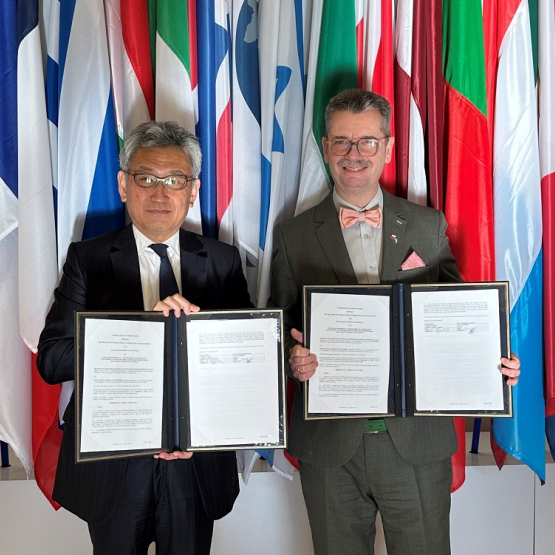
In today’s global society international cooperation in the fields of education and research is of key importance for university development. Universities all over the world, including SGH, more and more commonly participate in international cooperation networks, which facilitate exchange of knowledge, experience and resources.
International academic cooperation networks are platforms where universities from different countries work together in the area of education, scientific research and institution development. The networks allow them to initiate partnerships, exchange students and academic staff, and to run common research projects. Schools can broaden their horizons, take advantage of different perspectives and available resources, and increase their global visibility.
SGH plays an active role in international cooperation networks 1, which contributes to its internationalisation and raises its prestige globally. The major networks, in terms of SGH internationalisation strategy, include:

CIVICA – The European University of Social Sciences – the oldest alliance of European universities of social sciences, whose goal is to create synergy in education, scientific research and social activities. This modern partnership comprises ten leading European academic institutions (Bocconi University, Central European University, European University Institute, Hertie School, IE University, National University of Political Studies And Public Administration, Sciences Po, Stockholm School of Economics, SGH Warsaw School of Economics, London School of Economics and Political Sciences), which aim to be transformed into a centre of excellence in the field of social sciences.
CIVICA offers students and academic staff of participating universities access to interdisciplinary educational programmes, research projects and social initiatives that focus on tackling major social, economic, and political challenges of Europe and the world. The university pays special attention to international student mobility, thereby enabling exchange among partners.
CIVICA is an example of international cooperation that promotes academic, cultural, and social values. This innovative initiative aimed at shaping future leaders and generating knowledge impacts European and global future.

CEMS – Global Alliance in Management Education is a global network of business schools (34), corporate partners (69), and social partners (7), who cooperate to ensure highest quality management education and form future business leaders. CEMS is one of the world’s most renowned international masters’ programmes in business and management.
The programme gives students an opportunity to earn the title of MIM (Master in International Management) and access to a global network of partner universities and companies. CEMS students take part in international exchange, carry out practical international projects in renowned enterprises, and can use academic resources all over the world.
CEMS is famous for extraordinary quality of its programmes, intensive cross cultural growth, and strong emphasis on soft and practical skills. It is also a platform that facilitates making durable international contacts, which is very valuable for students’ future professional careers.
For students and alumni CEMS is not only a diploma, but also a pass to global job market and an opportunity for development in international business environment. CEMS programme enhances the process of shaping leaders ready to face challenges of the global market.

Partnership in International Management Network, commonly known as PIM, is a prestigious global consortium of leading business schools and institutions providing management education. Established with the aim of promoting international cooperation on management education, PIM is a platform for member institutions where they can engage in a broad scope of activities and initiatives.
Member schools of PIM offer diverse programmes, such as bachelor and master studies, as well as management studies. Their common feature is commitment to provide high-quality management education with global significance. Key aspects of PIM mission comprise support for the exchange of lecturers and students, facilitating research projects and encouraging cross cultural teaching experience.
The network’s strength lies in its diversified and broad membership encompassing different continents and cultures. The diversity enhances international perspective in management education and promotes broader insight into global business practices.
PIM plays a key role in shaping the future management education, by providing opportunities for cooperation, knowledge sharing and cultural exchange. By its initiatives and partnerships PIM conduces to the development of future business leaders, ready to face challenges and opportunities in contemporary connected world.

GBSN (Global Business School Network) is an international non-profit organisation established to support and promote collaboration among business schools across the world. Its main goal is to raise the influence of business education on the social and economic growth in developing countries.
GBSN offers its members access to networks of partners, exports and resources that allow business schools to expand their teaching programmes, scientific research and social activities that stimulate entrepreneurship and business growth in less economically developed countries. The organisation prepares numerous events, workshops and conferences that facilitate exchange of experience and best practices among business schools from various regions.
GBSN enjoys strong links with business schools, academic institutions, enterprises, and international organisations, which makes it possible to create partner projects and initiatives for sustainable economic development. GBSN activities are in line with the idea of global cooperation in the area of business education aimed at shaping future economic leaders and supporting social growth all over the world.
Let us note that SGH Warsaw School of Economics is the only Polish university in partnership with PIM and GBSN.
Participation in international cooperation networks brings numerous benefits. First, it gives students of the SGH Warsaw School of Economics access to foreign exchange programmes, which in turn allows them to gain international experience and broaden their horizons. Next, SGH has access to latest trends and innovations in the area of education and scientific research, which translates into the quality of its study and research programmes. Participation in international cooperation networks also makes SGH more attractive for students and academic staff from other countries. This in turn diversifies the academic environment.
Let us underscore that international cooperation networks are advantageous not only for SGH, but for the entire society. Due to cooperation with foreign academic organisations, SGH may contribute to international economic collaboration, cultural exchange and establishing connections between different countries.
In a globalised world it is essential to expand international collaboration in research and education. For SGH, participation in international academic cooperation networks is not only an opportunity for growth and higher quality of teaching and research, but also a way to build connections between cultures and support social development on an international scale.
MAŁGORZATA CHROMY, Acting Director of SGH International Centre
1 All the cooperation networks to which SGH belongs are listed on the website https://www.sgh.waw.pl/sieci-wspolpracy
Foto: Freepik



